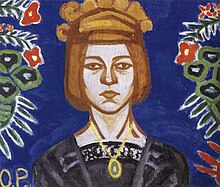Olga Rozanova
Appearance

Olga Vladimirovna Rozanova (22 June 1886 – 7 November 1918, Moscow) was a Russian artist in the styles of Suprematism, Neo-Primitivism, and Cubo-Futurism. In 1916 she married the poet Aleksei Kruchenykh and joined the group of Russian avant-garde artists Supremus, led by Kazimir Malevich.
| This article about an artist is a stub. You can help out with Wikiquote by expanding it! |
Quotes of Olga Rozanova
[edit]- sorted chronologically, by date of the quotes of Olga Rozanova


- The Bases of the New Creation and the Reasons Why It Is Misunderstood.
- the title of her essay, 1913; as quoted by Anya Wyman: 'Rediscovering Rozanova', 12 May, 2000
- in her essay Rozanova describes the process of 'creation' in 3 stages: 1: the intuitive principle, 2: individual transformation of the visible, 3: abstract creation
- Opponents of the New Art fall back on this calculation, rejecting its self-sufficient meaning and, having declared it 'Transitional,' being unable even to understand properly the conception of this Art, lumping together Cubism, Futurism, and other phenomena of artistic life, not ascertaining for themselves either their essential differences or the shared tenets that link them.
- Olga Rozanova, in 'Osnovy Novogo Tvorchestva i printsipy ego neponimaniia,' Soiuz molodezhi 3 (March 1913), p. 18; as quoted by Svetlana Dzhafarova, in The great Utopia - The Russian and Soviet Avant-Garde, 1915-1932 (transl. Jane Bobko); Guggenheim Museum, New York, 1992, p. 477
- Olga Rozanova accused the critics and their brethren of bad faith, citing as a prime example Aleksandr Benua's "Kubizm ili Kukishizm" ("Cubism or Je-m'en-foutisme"), a scathing 1912 review
- Principles heretofore unknown, signifying the emergence of a new era in creative work - an era of purely artistic achievements. An era of the final emancipation of the Great Art of Painting from Literary, Social, and crudely everyday attributes uncharacteristic of it at its core. The elaboration of this valuable world outlook is the service of our times, irrespective of idle speculation about how quickly the individual trends created by it will flash by.
- Olga Rozanova, in 'Osnovy Novogo Tvorchestva i printsipy ego neponimaniia,' Soiuz molodezhi 3 (March 1913), pp. 20-21; as quoted by Svetlana Dzhafarova, in The great Utopia - The Russian and Soviet Avant-Garde, 1915-1932 (transl. Jane Bobko); Guggenheim Museum, New York, 1992, p. 477
- Only the absence of honesty and of a true love of art provides some artists with the affrontery to live on stale cans of artistic economics stocked up for years, and, year in year out, until they are fifty, to mutter about what they had first started to talk about when they were twenty.
- Quote, 1913, in 'Osnovy novogo tvorchestva i prichiny ego neponimaniia,', in 'Soiuz molodezhi' (St. Petersburg), March 1913, p. 20; translated in John E. Bowlt, The Russian Avant- Garde: Theory and Criticism; Thames and Hudson, London 1988, p. 109
Quotes about Olga Rozanova
[edit]- sorted chronologically, by date of the quotes about Olga Rozanova
- "Closely examining Rozanova's Suprematist period, we see that Rozanova's Suprematism is contrary to that of Kazimir Malevich, who constructs his works from a composition of quadrate forms, while Rozanova constructs hers from color. For Malevich, color exists solely to distinguish one plane from another; for Rozanova, the composition serves to reveal all the possibilities of color on a plane. In Suprematism, she offered a Suprematism of painting, not of the square [referring to Malevich].
- Quote by Varst (Varvara Stepanova) 1919, in 'Vystavka Ol'gi Rozanovoi,' hkusstvo 4 (February 22, 1919), pp. 2-3; as quoted by Svetlana Dzhafarova, in The great Utopia - The Russian and Soviet Avant-Garde, 1915-1932 (transl. Jane Bobko); Guggenheim Museum, New York, 1992, p. 477
- Quote from Varvara Stepanova's review of the posthumous Rozanova exhibition (the First State Exhibition) held in Moscow in the winter of 1918-19
- Rozanova was well aware of Italian Futurism, although unlike Exter, she did not travel in Italy.. .In her careful application of the Italian Futurist evocation of mechanical speed, explosivity, and mobility, Rozanova followed the same path as Malevich (as in his 'Knife-Grinder', 1912;) and Kliun (as in his 'Ozonator', 1913—14), and her concurrent writings suggest, she regarded Futurism to be a key phase in the artistic evolution toward Suprematism. Rozanova expressed this impulse not only in her vivid, dynamic paintings, but also in what Yurii Annenkov described as the 'black plumes of her drawing'.
- Quote of John Bowlt, in Amazons of the Avant-Garde, ed. John E. Bowlt and Matthew Drutt; Guggenheim Museum, Guggenheim Museum Publications, NY 2000, p. 30


